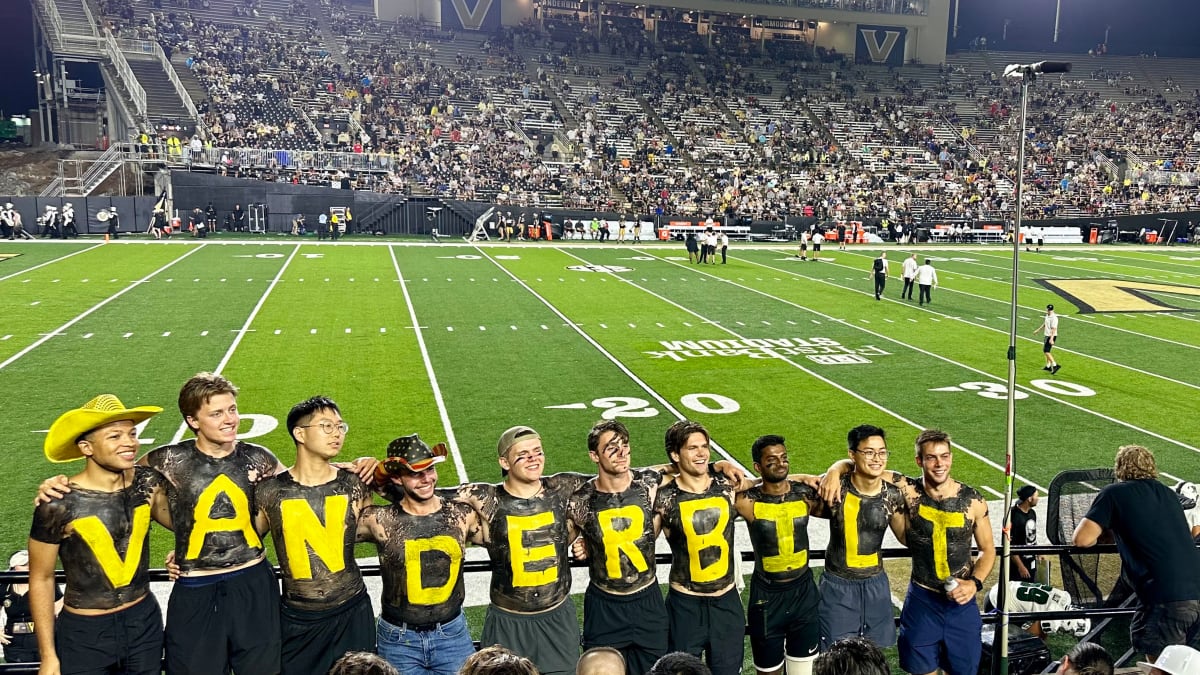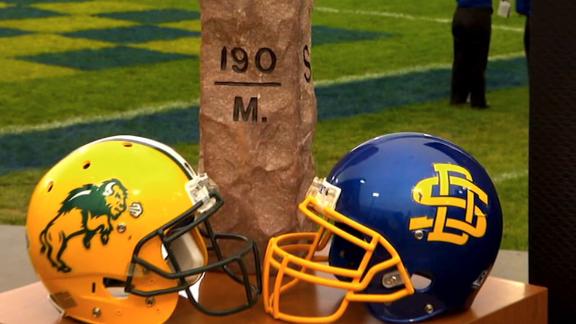OPINION: A Mountain West Administrator Made History By Proposing a Promotion/Relegation Model for College Football. Here’s Why It Will Never Work.
PHILADELPHIA, PA – In what is believed to be a historic first, an idea of college football was floated around as a solution as a part of a Pac-2 merger with the Mountain West conference.
Boise State associate athletic director Michael Walshwrote wrote an in-depth plan for a three-tiered alliance of 24 FBS football teams in Pacific, Mountain, and Central time zones, with the opportunity for promotion and relegation at the end of each season. Front Office Sports reviewed the plan, which doesn’t only involve the Pac-2 and Mountain West but also select teams from the AAC, Conference USA and WAC.
It’s an ingenious idea. But it cannot possibly work in college football.
The promotion/relegation model has been adopted by English soccer and has been an emulated model by soccer associations across the world (except, weirdly, Major League Soccer in America). And there’s a reason for that.

Scheduling
America is a large country with six time zones (including Alaska and Hawai’i).
A professional league like MLS where, say, the Rochester Rhinos get promoted and the LA Galaxy get relegated not only harms potential TV value or revenue from year to year, it also wreaks havoc on scheduling, and, most important of all, rivalries.
In soccer, this has been a big debate as the lower divisions of US soccer, the USL, have been publicly thinking about doing this for quite some time now.
Understandably, though, the large MLS teams are not enthused about introducing promotion and relegation for MLS, and for good reason.
“If you’re John Ingram and Nashville SC, and you just built a privately funded 30,000-seat stadium in Nashville,” MLS executive vice president of communications Dan Courtemanche told Front Office Sports, “then all of a sudden you buy into this league, and three years later you might be relegated after you just made an investment in all this.”
Part of the reason is Ingram’s investment in Nashville SC is to travel long distances to play home-and home games against Lionel Messi and Miami, not taking buses to play home-and-home games against the Charlotte Battery.
Anyone who has been around college football or college athletics will tell you how important scheduling is, and how far out in advance schedules are planned. For example, recently UConn and Pitt scheduled a series of out-of-conference series of games in 2027 and 2028.
And there’s a reason for that – it gives athletic departments and alumni associations months to plan travel packages for family and fans to make the trip.
Fans of Wrexham might splurge for a midday bus trip to see their team play the Dag & Red, but setting up a football weekend eight hours away from Storrs, Connecticut to Pittsburgh, PA requires logistics, planning, setup, hotels, and time.
Promotion and relegation wreck this dynamic. It’s impossible to schedule games with what could be conferencemates the following year, and from year to year it would be impossible to know your future schedule.
And grouping regionally doesn’t really help. Let’s hypothetically apply this to the Big 10. What if USC is the team that is “demoted”? Where do they go, to the MAC? It’s like the LA Galaxy getting demoted and the Rochester Rhinos getting promoted in MLS – those leagues that have it accept that some years there will be more teams in a region than others.
In what is essentially a country like England where you can realistically get anywhere by bus or train, it’s not that big a deal to have different schedules every year, or more teams from, say, the London area than other years. But not America.
Rivalries
Even more important would be the potential disappearance of more classic football rivalries.
When the Pac-12 was raided this summer, many in the media wrung their hands about the loss of regional rivalries like Washington/Washington State or USC/UCLA. Adding promotion and relegation to this will accelerate college football rivalry destruction.
Let’s say, hypothetically, the Big 10, MAC and select teams from Pennsylvania to Nebraska entered a promotion/relegation system. And then, say, Michigan one year struggled, and got relegated to the MAC.
Instantly there would be a huge problem. The epic Michigan/Ohio State Rivalry game would no longer be on the schedule every year.
In England, the system gets around this by having multiple cup games (i.e. essentially randomized out of conference games) that involve teams from multiple levels of soccer. But mostly, English football fans accept that there are plenty of years or maybe decades when they don’t play their Rivals.
Taking the example further – Wrexham AFC and Chester FC are bitter local rivals, but are not in the same league. But through cup games, they could possibly randomly play each other. There are plenty of years when they won’t play each other, but that is something that English soccer fans are willing to put up with.
But that’s not the system college football has today. They have an entire system in place that attempts preserves local rivalries and ensure they are on the schedule every year.
Before rich media idiots ran the conferences, that was the priority of conference membership, after all.
There’s no easy solution to the “Michigan gets relegated” problem, either, for college football.
Having one or two protected rivals? That could make Ohio State’s football schedule much harder than a school who happens to have, say, Vanderbilt or Rutgers as its Rival.
Leave it up to the schools to schedule what out of conference games they want? Why would Ohio State willingly schedule a tough Rival opponent in a lower division, when they could pay to have Youngstown State come in instead and lose by double digits with little possible harm to their postseason chances?
The physical demands of college football limit it to 12 or 13 game season for most programs and a 14 or 15 game season for few. There isn’t a lot of room for vanity out of conference games with rivals, especially with large conferences. If you have a 10 team Big 10, that’s three out of conference games – and the Big 10 isn’t actually 10 teams, its going to be 16. How else do you protect those rivalries without well defined conferences and rules? It’s already challenging enough without promotion and relegation.
In a sport like basketball, where conference games are home-and-home and there are plenty of slots for preseason tournaments and out-of-conference games, it’s not an issue to plug in one game with a local rival every year if necessary. But in football there are so few games and the stakes are so high there’s little incentive to keep the rivalries together unless the teams are in the same conference.

Money
It’s no secret that through TV money, promotion and relegation means gobs more money from the promoted teams. Conversely, it also means less money for the relegated teams.
For English football clubs, whose only business is soccer, that’s a challenge, but a business challenge. Relegated teams find ways to make money and get promoted, maybe by buying new players or getting new coaches, or both. It can be a very costly and time-consuming process – ask any Wrexham fan.
But that’s not how college athletics works.
Taking the MLS example, MLS teams have long resisted promotion and relegation because they say that their primary mission in America is “growing the game” and sinking money into facilities, stadiums and fan experiences.
“Promotion-relegation rewards teams and owners based on performance and not necessarily building stadiums and building a league,” Courtemanche told Front Office Sports. “And because we are a young league, we’ve had to create teams on the field, we’ve had to build stadiums, we’ve had to build facilities, we’ve had to build infrastructure.”
In college athletics, the whole idea is supposed to be not only building football programs, but entire athletics departments.
Even at very rich schools like Auburn, the money coming in from the conferences funds the rest of their sports, which by and large don’t make money.
Part of the reason why this model works at Auburn is their stable conference membership. They get a basically predictable (large) amount of money for their budget from the conference revenue, and they allocate that to wrestling, volleyball, field hockey and any number of non-revenue sports.
Promotion and relegation wreck the predictability of this model.
What would happen if Auburn got relegated to, say, Conference USA and discovered they had to cut millions from their athletic department? It would mean, in no uncertain terms, cutting sports and reducing opportunities for both men (and through Title IX, women).
What about a recently promoted team? Let’s say Bowling Green gets promoted to the Big 10. Are they suddenly from scratch going to field more athletic teams? It’s possible they get relegated again the next year, or the year after that. Is it even prudent to them sponsor extra sports? Sports sponsorship requires funding stability.
/cdn.vox-cdn.com/uploads/chorus_image/image/71679952/1444866551.0.jpg)
No Honeymoon
It seems like people who love promotion and relegation love the romance of it but don’t think about the broader implications. They like the idea of extra revenue for promoted schools, but not the idea of less revenue for relegated schools and what it means.
They like the meritocratic idea of promotion, until realizing it could jeopardize their bitter annual rivalry.
They like the theater of some new interesting games, until realizing that disrupting that means you’re less likely to plan to go to games.
I give credit to Michael Walshwrote for coming up with a possible system to do promotion and relegation – it is ingenious.
But the reality of college football means that it would be a big mistake to implement it. It would likely over time cause the majority of fans and alumni to lose interest and to accelerate college football sliding into irrelevance, becoming a second- or third-tier NFL minor league.
Annual games with their bitter rivals and mostly predictable schedules is what fans want. They have never said they want anything different.

Chuck has been writing about Lehigh football since the dawn of the internet, or perhaps it only seems like it. He’s executive editor of the College Sports Journal and has also written a book, The Rivalry: How Two Schools Started the Most Played College Football Series.
Reach him at: this email or click below:

